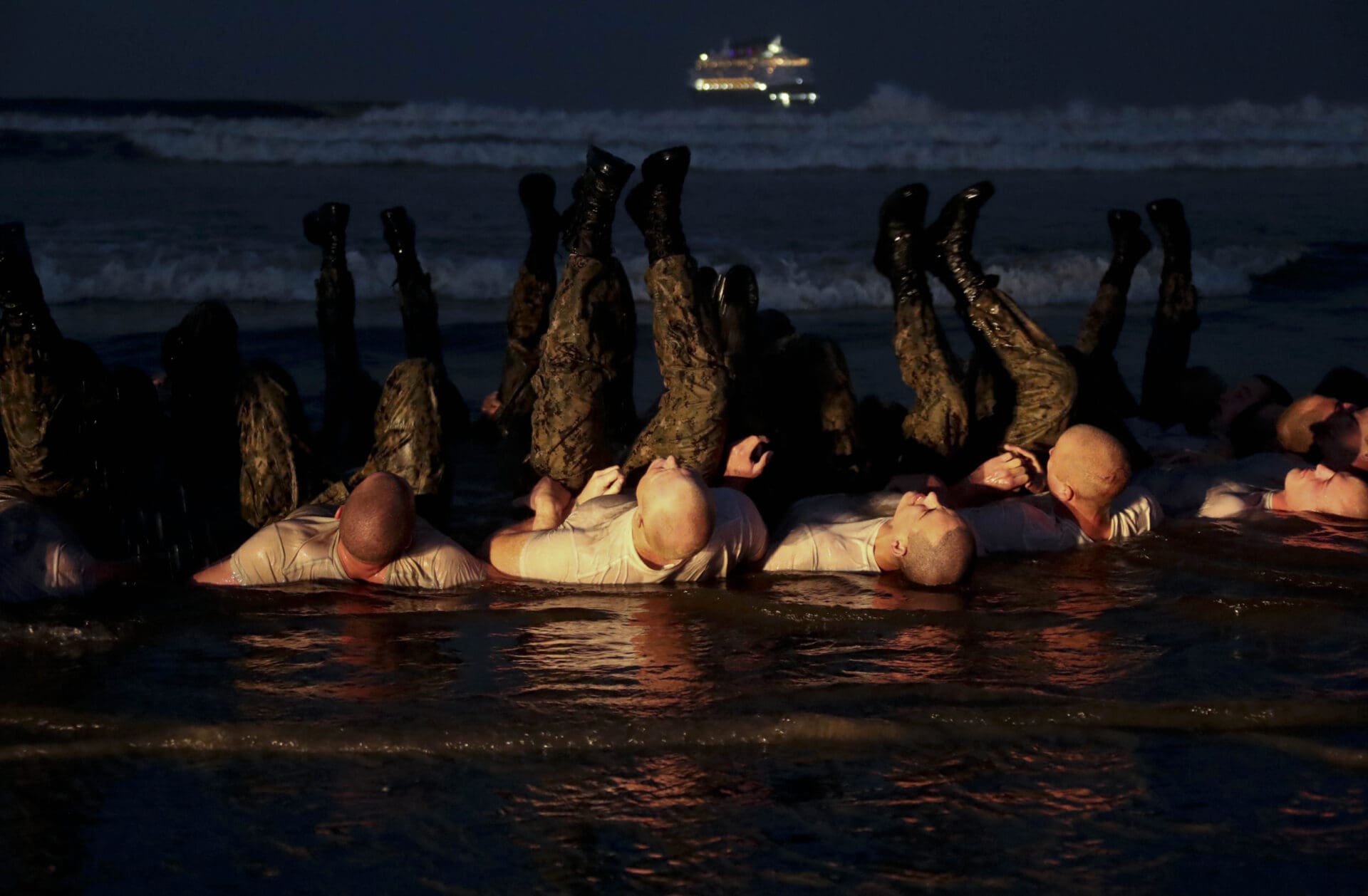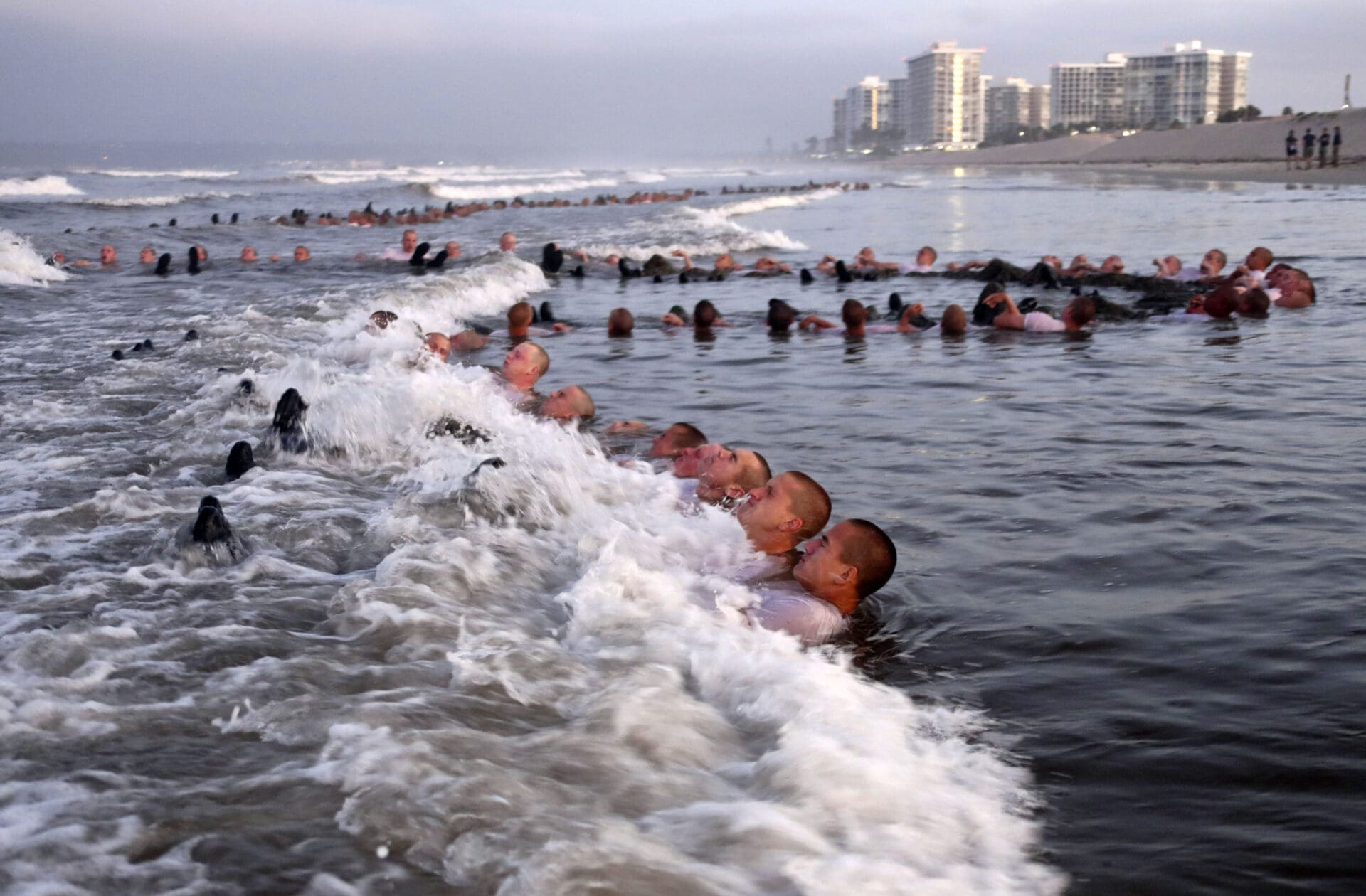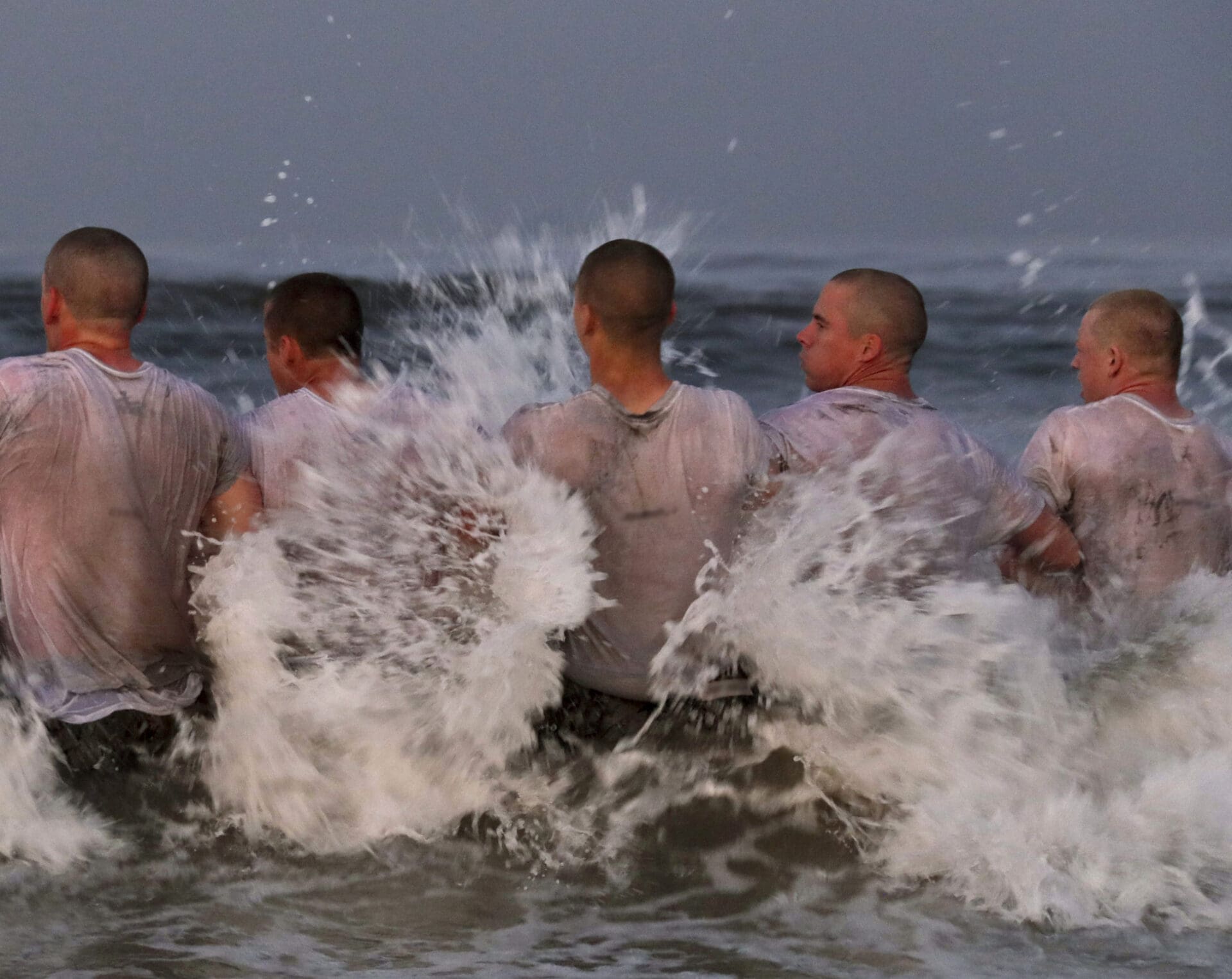
By Julie Watson, AP
Navy SEAL recruits and their instructors are being tested for the coronavirus as the candidates in one of the military’s most grueling programs return to training with new social distancing guidelines, a top official said Tuesday.
Everyone in the first phase of training will be tested to try to detect if anyone is infected but asymptomatic, Capt. Bart Randall said. The rapid tests to be administered this week to 170 recruits and instructors are part of a defense department pilot project.
“Ideally we’ll get any asymptomatic shedders out of the population to help keep the rest of the guys safe,” said Randall, the Naval Special Warfare Center’s commodore.
The recruits returned to training Monday after classes were paused March 16 as leaders established safety standards amid the pandemic.
There are noticeable differences.

Each recruit is checked daily for symptoms of the virus. Instructors are wearing masks and surgical gloves and shouting into megaphones rather than recruits’ faces. Only a limited number of SEAL trainees are allowed into classrooms at a time or during swims and runs.
No positive cases have been found so far at the training school for the SEAL recruits or candidates for special warfare boat operators, Randall said.
Anyone showing symptoms of the virus will be immediately pulled from training and evaluated by a medical team and placed into quarantine if determined to be a potential case, Randall said.
The SEAL program tests participants’ physical and psychological strength along with water competency and leadership skills.
It starts at the Naval station in Great Lakes, Illinois and typically ends 65 weeks later with graduation in Coronado, across the bay from San Diego. Each graduate is awarded the special warfare insignia known as the Trident that denotes membership in the elite fighting force: The pin features a golden eagle wrapped around a U.S. Navy anchor, while clutching a three-prong trident, and a flintlock style pistol.
The program is so grueling that 75% of candidates drop out by the end of the first month in phase one. That’s when trainees undergo what is known as Hell Week when recruits are pushed to the limit with little sleep.

Medical crews will be watching closely this year to ensure any coughs or other flu-like symptoms that often are produced by the strenuous workouts are not a sign of the coronavirus, Randall said.
For most people, the coronavirus causes mild or moderate symptoms, such as fever and cough that clear up in two to three weeks. For some, especially older adults and people with existing health problems, it can cause more severe illness, including pneumonia, and death. The vast majority of people recover.




can you wear a henway with a nehru?
SEALs can do BUDS while on a ventilator…
As long as it’s a gold ventilator and has a “I’m #1” balloon attached to it.
There is probably no other demographic less likely to suffer from the Kung Flu than Navy SEALs.
Agree. Politically correct crap and overkill. Get the candidates thoroughly tested when they come in. Social distancing is just ONE WAY of keeping the virus from spreading. The candidates are a very finite population that can be tested and kept together. No need to do all of the social distancing if all of the tested, non -Covid guys are together.
Some instructors go home at the end of the day. Their wives are there, who have been out shopping or working, etc etc…
https://www.amazon.com/Training-War-Essay-Tom-Kratman-ebook/dp/B00JQI9TH2
As the title suggests, some thoughts on training for war. The more you suffer in training, the less you suffer in war. The less you suffer in training, the more you will suffer in war.
You don’t stop training, period.
During the flu epidemic in 1918, they didn’t close down all the boot camps, or training centers, or anything. The war went on . . .
The Pentagon has deemed Covid19 permanently disqualifying for military service. New recruits that test positive, or are perfectly healthy but tested positive for Covid19 at any time in the past are booted from the recruiting process.
Seems to be an inordinately drastic response in my opinion, but I’ve never served so I don’t know if this is a normal military response.
You beat me to it. I scrolled down here to post the very same observation.
Curious if you have a link to this? Chances are, most of the population will get it or get vaccinated, and new antibody studies are showing this over-hyped pandemic may have already been in the US as early as December. Deaths that may be related to influenza A & B strains are all being reported as COVID deaths since there is a push for numbers.
Is this a UN proposal to shut down our military? Permanently disqualified seems utterly nonsensical. If you’ve had it, your significantly less likely to get it a second time, so these seem like ideal candidates!
“Anyone who has been diagnosed with COVID-19 will have to wait until 28 days after diagnosis to report to MEPS.”
Come on people, learn to check a little before posting. Don’t just go off headlines
That part is somewhat unclear — but it does state “permanently disqualifying” in multiple places in the memo. It reads to me, and again I have no military, as this;
If you test positive for Covid19, they want you to keep away for 28 days to avoid risking infection to recruiting staff. After 28 days, they deem you safe enough to come back to finish your paperwork processing you out as permanently disqualified.
Here’s a link directly to the memo.
https://pbs.twimg.com/media/EXMcgS1UYAAGBp7?format=jpg&name=medium
Basically, once you show up for MEPS, if you test positive or have a history, they still have to finish the paperwork for that day. So they’ll mark you as “whatever” and send you home for quarantine, etc… Then when you come back, they process you as normal. I think you’re taking the “permanently disqualifying” thing a bit too literally. The DoD issues wavers for people missing whole limbs. There is very little that is actually “permanently disqualifying” in the literal sense of the word.
Serge is right.
If you present a positive laboratory test result, this is a disqualification. However, a 3P designation can still get a waiver.
There are several ways around this.
The dumbest one is: get a waiver.
The smartest one is: don’t show up sick and make sure they don’t think you ever were sick. Ever. In your whole damn life.
As it was explained to me by my recruiter, after I told him I had in fact had several broken bones, a history of seizures, and had been previously disqualified from service, but was willing to do whatever it took to get in:
“You know what “NO” means Mr. Taylor? It’s an acronym. It stands for “Neverending Opportunity”. So when the doctor asks you a question, you answer “NO”. Because that’s what you want, Neverending Opportunity. Had any broken bones? No. Any head injuries? No. Any surgeries? No. Allergic to bees? No. Any history of seizures? No. Anything that might disqualify you from military service? No.”
“Raise you right hand and welcome to the army, Private Taylor.”
JWT. My induction physical was at the AAFES station in Ashland KY. Part of the testing was the blood draw. After jabbing me 5-6 times with the needle the medic couldn’t get the vein. His supervisor tried once and still no blood.
He finally shrugged and passed me anyway with no blood drawn. Such were the times.
Other commenters have already said as much – but I was “disqualified” and served anyway. When corpmen and doctors asked questions, I just played dumb all along. Heart murmur? I don’t even know what a heart murmur is, Sir. One Corpsman actually heard my heart murmur, but the doctor who checked up on it never found it. I guess the old heart only murmured when it wanted to, and stayed hidden from military doctors. Other lesser medical “conditions” weren’t such a big deal, but I was determined to serve. Stupid medical conditions weren’t going to stop me!
None of my business…….
SEAL snipers are experts at social distancing.
Anybody who’s served knows what the “recruit crud” is. In the first three weeks of recruit training EVERYBODY gets a URI of some form. You push through and get over it. I would expect SEALs to be more than competent enough to do so.
Yes. You bring 50 kids in from all over the US and put them in a big open bay barracks and they all wind up with the hack.
And if you’re permanently disqualified for testing positive for the beer virus what do the top brass propose? Limit recruiting to a 100 people a year?
Lol… 50… By recruit platoon had over 100. The squad bays at PI are MUCH larger than they appear on TV.
We started with 69, ended with 34. The culprit, illness and…believe it or not, hypothermia. At Fort Benning, Georgia.
JWT, I believe the hypothermia thing. Right here in sunny CA we were sent to Grizzly island. The navy had a unit there for training riverine forces. Brown water navy. The powers that be decided we needed to train assaulting from the over powered dingies the squids had. Those marshes and sloughs were cold as hell. They connected to the SF bay. Some times there would be ice on the fringes of the water. In sunny CA. The worst was the tooley fog. We did not have gps back then and you had days where you could stick your arm out straight and not see your own hand. Weird, cold and easy to get lost in those muddy assed marshes.
I learned one truth about the military. If you had a job that was outside you were going to have no perfect weather. It was always too hot, too cold, too wet, too windy…..but I kinda liked it, anyway. Maybe i’m the weird one?
You want social distancing be a sniper. You wanna be SEAL get under that log and lift.
ABSURD
What does the government know that we don’t? What are they hiding from the public?
SEALS train in the Tijuana River slough and Imperial Beach which often suffers from Mexico’s sewage spills. While no one knows how much COVID is in the sewage, the other diseases in the runoff like meningitis are much worse.
Just my opinion. Yes, they can train. However, I do not think they can train as effectively.
This. And it’s certainly not limited to the SEALS. People are failing to realize that the instructors/drill sgts/etc go home at the end of the day. To their families who have been out and about more than likely. So that group of soldiers may have been isolated together for training, but those training them have not been. That’s how it gets bad. I highly doubt there are measures in place preventing trainers from going home to their families currently.
If they wear masks while having sex with each other.
Comments are closed.